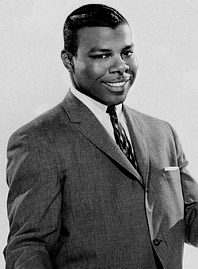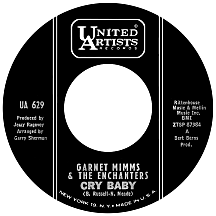GARNET MIMMS AND
THE ENCHANTERS
Cry Baby
While working at an appliance store in Philadelphia, Jerry Ragovoy and store owner Herb Slotkin put together a little money to produce a talented vocal group, The Castelles, establishing Grand Records primarily for the purpose of recording local acts. The group's "My Girl Awaits Me" generated a fair amount of interest in the area in 1953 and turned out to be the bug that bit Ragovoy, infecting him with a lifelong passion for music-making. After a few years of hard knocks, he went to work for Chancellor Records, a very successful Philly label and major player in the late-'50s rock and roll teen idol movement. "About This Thing Called Love," cowritten with Clyde Norris and Leroy Roebuck, became Ragovoy's national breakthrough when Fabian took it to the top 40 in early 1960. Over the next few years, Jerry had success using the pen name Norman Meade, supplying material for The Majors, Bobby Vinton, Irma Thomas, Baby Washington, The Drifters and others. His biggest hit and, arguably, greatest artistic creation came in 1963; "Cry Baby," a collaboration with Bert Berns, came alive in a gospelized rhythm and blues recording by singer Garnet Mimms, who'd been on the Philly scene for several years and, like Jerry, was determined to carve his own niche in the music business.
The Mimms family moved from rural West Virginia to Philadelphia when Garrett, who somehow wound up being known as "Garnet" (perhaps tired of correcting people who mispronounced the name) was very young. He sang in church and later joined gospel groups The Norfolk Four and The Evening Star Quartet; during a two year stretch in the Army he performed with a secular singing group, The Deltones. Meanwhile, Little Joe Cook, an Evening Star Quartet member who'd formed Little Joe and the Thrillers, scored a national hit, "Peanuts," in 1957, inspiring the 24-year-old Garnet to put together his own post-military doo wop quintet with another Evening Star singer, Samuel Bell, and three other friends, Howard Tate, Willie Combo and John Jefferson. As The Gainors, they recorded "You Must Be an Angel" for Red Top, a small local label. Philadelphia's Cameo Records signed the group and released "The Secret," a song by by Irvin Roth and transplanted Londoner Joe Lubin, which was a top 20 hit...not for the Gainors, but for pop singer Gordon MacRae.
Garnet and his Gainors waxed a few sides for Mercury Records in '59 and '60 including Bell's uptempo "She's My Lollipop" and "She's Gone," a strong ballad Mimms penned himself. Two singles on the Talley-Ho label revealed a more comfortable Garnet singing lead under producer Doc Bagby; "Tell Him," a Van McCoy song, was the best effort from these 1961 sessions. By the summer of '63, some roster changes had occurred. Mimms and Bell were joined by Zola Pearnell, a Philly native who'd been performing for some time in Europe, and Charles Boyer (yes, there were two entertainers with that name!); they called themselves Garnet Mimms and the Enchanters.
Berns and Ragovoy, determined to break the act, took them under their dual pairs of wings with the help of crack arranger Garry Sherman, and "Cry Baby" began to take shape, despite the quartet having no record contract. Bert suggested a spoken passage ('...even though you made a fool of me so many times before...'), certain that Garnet could pull it off; his personality on the song's segment drove its appeal up a notch. Ragovoy brought in several gospel singers (Cissy Houston, Sylvia Shemwell and Dee Dee Warwick are said to have sung on the session), placing the Enchanters on the sidelines...just temporarily, you understand. The combination of vocal talents, forceful arrangement and a passionate performance by Garnet garnered the desired result, though finding a label to release the recording was challenging; after approaching several companies, Ragovoy convinced United Artists to give it a chance. Developing steadily throughout August, the single reached the pop top ten in September and secured the number one spot on the R&B charts in October.

"Baby Don't You Weep" followed a similar formula, complete with spoken part, while "For Your Precious Love" was more of a straight remake of the 1958 hit by Jerry Butler and The Impressions; both sides made the top 40 near the end of the year. "Tell Me Baby" started off 1964, but wasn't nearly as popular as it deserved to be. With future Sweet Inspirations singer Houston and company doing most of the backing vocals, Sam, Charles and Zola voiced their objection by quitting (no hard feelings, Garnet) and taking an offer from Warner Bros. Sam Bell and Ragovoy (as Norman Meade) wrote "I Wanna Thank You," the first release for The Enchanters, which made a brief chart appearance in September. Summer single "A Quiet Place" was one of only a few credited to Garnet Mimms and the Enchanters that actually featured the group in that configuration; the flip side, "One Girl," was the first of many solo Mimms releases.
The Enchanters were moved to WB's Loma label in 1965, but after three more Ragovoy-produced 45s, they faded away. Mimms kept rolling solo, singing and speaking on a nice selection of Ragovoy and/or Berns tunes, staking his claim as one of the best mid-'60s soul singers despite a discouraging lack of airplay. "Look Away," a remake of the 1961 Jarmels hit "A Little Bit of Soap" and the more-easy-breezy-than-usual "That Goes to Show You" were among the highlights of '65. Radio and record buyers weren't through with the Big G.M. just yet; on "I'll Take Good Care of You" he asserted his fallback gospel soul sound and returned to the top 40 in the spring of '66. Shortly afterwards, his former sidekick Howard Tate began a nice string of Ragovoy-helmed solo hits for the Verve label, commencing with "Ain't Nobody Home."
United Artists moved Mimms to the Veep subsidiary label that year, while he remained with the same producing team. Jerry later expressed bewilderment at the lack of success they had with these efforts he considered every bit as good as the UA hits. "It's Been Such a Long Way Home" was the most promising, but after a few more singles, Mimms followed Tate to Verve (about the time Howard jumped ship to work with Lloyd Price at Turntable Records), staying in his comfort zone with longtime partners Ragovoy and Sherman until 1970.
Around that time, Janis Joplin's rock remake of "Cry Baby" refocused eyes on Garnet and, moreso, Jerry Ragovoy (she did a couple of Jerry's other songs, a.k.a. Mimms and Tate remakes, on what became her postmortem '71 album Pearl). Garnet recorded for GSF around 1972, then reemerged on Arista in the spring of '77, his voice nearly unrecognizable, with the disco-fied "What It Is" by Garnet Mimms and Truckin' Company, a gimmicky track produced by Jeff Lane (best known for his work with Brass Construction), complete with mock-Star Wars-creature sound effects. The confusing thing is, the movie was still a month from release, suggesting these guys had some sort of insider info on the coming sci-fi phenomenon. So...'What's it all about, C-3???'


